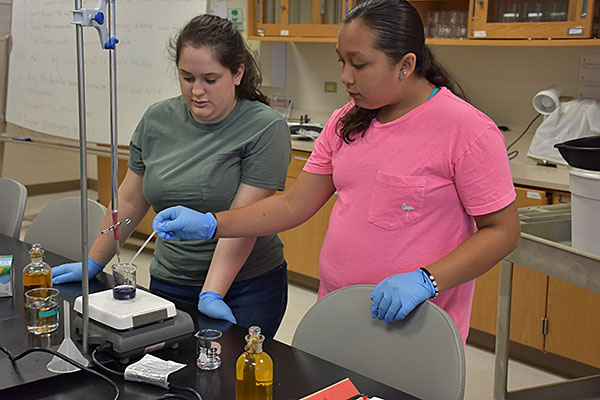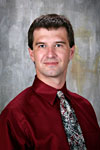UHV summer camp teaches students about aquatic ecosystems

Seven middle and high school students bent over lab equipment, concentrating as they added liquids to beakers and watched the solutions change colors from yellow to blue to clear.
The students were taking part in the University of Houston-Victoria’s Aquatic Science Summer Camp. The camp took place from July 24 to Friday, and the theme was “How fertilizer kills: a look at nutrients, microbes and oxygen.”
“We’ve wanted to have this camp for a while, and a Trull Foundation grant made it possible,” said Dmitri Sobolev, a UHV associate professor of biology. “This is a great opportunity to inspire students who are interested in science and help them see how ecosystems are interconnected, which means changing one can cause unintended consequences in another.”
The Trull Foundation of Palacios awarded UHV a $6,000 grant to hold the camp. During the camp, students took a trip to the Tres Palacios River outside Victoria and collected water samples. The students then analyzed the samples and compared the oxygen levels in the water to other samples created in the lab.
The experiments were designed to show how fertilizer used in growing plants on land can cause oxygen depletion in aquatic ecosystems that end up killing aquatic organisms, Sobolev said.
“The fertilizer causes aquatic plants to grow, and those plants produce an excess of oxygen,” he said. “But water can only hold so much oxygen, and the rest is released into the air. Then, when that overgrowth of plant material starts to decompose, the process depletes the oxygen in the water, which causes other organisms to die.”
For St. Joseph High School sophomore Erin Dent, the camp was an interesting look at how the environment works and some of the unexpected problems it can face.
“I’m interested in helping the environment, so I’ve been thinking about going into environmental science,” she said. “This camp is helping me prepare for that and for next school year. There’s a surprising amount of chemistry involved, and I will be taking chemistry next year.”
Brooke Finley, a junior at Liberty Academy, heard about the camp through her science teacher. Although she is taking some college courses to earn dual credit, this is the first time she has been able to work in a college science lab.
“There’s some great equipment here, and it really helps people who are interested in learning,” Finley said. “It’s a different experience from what I’ve seen in high school. Dr. Sobolev still explains everything clearly like our teacher does, but when we’re conducting the lab, he lets us be a bit more independent.”
Sobolev hopes to be able to offer the camp every year. In addition, the university is planning to host a similar camp on Saturdays in the fall through a grant from the National Oceanic and Atmospheric Administration.
“This camp was a good learning experience for everyone,” Sobolev said. “We’ve found a few things that can be improved for future sessions, and we even came across an interesting factor in our experiment that we weren’t expecting. I’m looking forward to seeing how the next camp will develop.”
The University of Houston-Victoria, located in the heart of the Coastal Bend region since 1973 in Victoria, Texas, offers courses leading to more than 80 academic programs in the schools of Arts & Sciences; Business Administration; and Education, Health Professions & Human Development. UHV provides face-to-face classes at its Victoria campus, as well as an instructional site in Katy, Texas, and online classes that students can take from anywhere. UHV supports the American Association of State Colleges and Universities Opportunities for All initiative to increase awareness about state colleges and universities and the important role they have in providing a high-quality and accessible education to an increasingly diverse student population, as well as contributing to regional and state economic development.
Lauren Hightower-Emerson
361-570-4342





